15th year into its running in Singapore, the International Coastal Cleanup is held worldwide on this day where people from coastal cities around the world come together to not just remove litter from our shorelines but also to collate and compile the data of what trash is out there. Such data is collected, compiled and sent to the international organizer, Ocean Conservancy who will then forward it to major agencies like United Nations where even UN Secretary General Kofi Annan and used the data in his speeches before. The International Coastal Cleanup started as early as 1986 where the first cleanup was organized by the Ocean Conservancy in Texas, USA.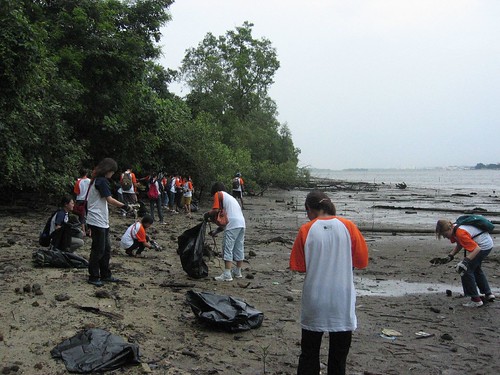
Despite being a volunteer of the Raffles Museum who is the Singapore coordinator of ICCS, I have never actually participated in ICCS. Subsequently, I always get poked at for not having mucked in the mud or even gotten my hands dirty. Being flooded with work from school and my other ubin activities, I decided to commit to only being a participant with the NUS contingent this year and leave the organizational work to my dedicated friends and Toddycats counterparts.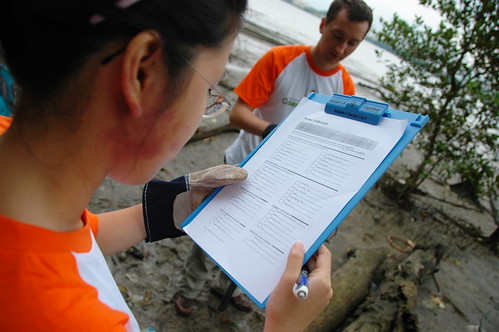
Monkey hard at work, analyzing the categories of trash. Photo by Kenneth
Being a participant was very interesting. Sadly I didn't manage to get my hands very dirty because I was the data recorder while the 2 strong guys in my group did the hard work. However, classifying trash is not as easy as I thought! Deciding what category to classify a chair or bucket under can be really agonizing. 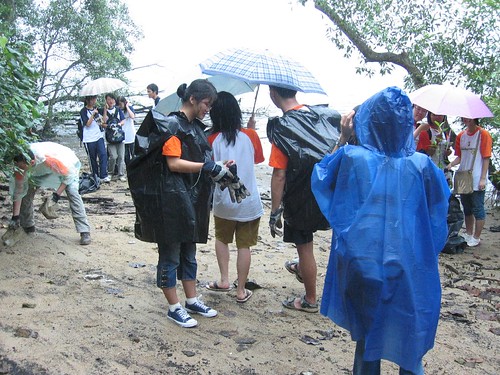
Continuing to work in the rain
It started to rain about 30 minutes into our trash elimination exercise. It was disheartening but we put on our poncho and continued working. It was also such great joy for me to see my toddycats friends again whom I hardly get a chance to meet these days.
It was inspiring to see them running around covered in mud and grime. Every one of them from Huaqin, Yueat Tin, Anand and Weisiong who were in the field with the participants to Anand the data manager in the SBWR workroom and even Kenneth the photographer of the day who sacrificed his camera to the rain. I enjoyed seeing their surprised faces when they saw me as they all know I was not involved in ICCS. Even familiar faces from the NUS Campus Sustainability Committee was welcoming. It felt like a reunion of old friends, out in nature, doing something productive. Kudos to everybody who worked hard today!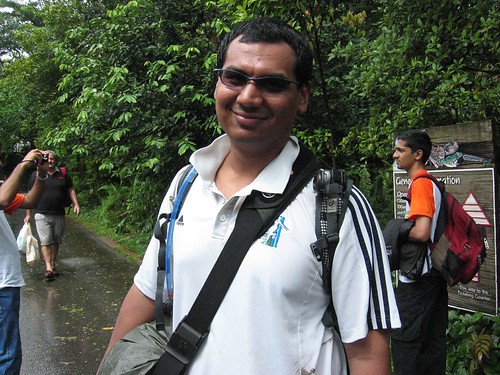
Kenneth, the official photographer
Best of all, I finally got to witness in person the students from the Singapore American School in action. Their spirit and gungho-ness touched and impressed me. From the youngest kids in grade school who asked for more bags of trash to haul out to the older teenagers who hurl bags and cart wheelbarrows. Compared to them, I should be ashamed of myself! I also finally met Kate who started it all. I asked her about a sea hibiscus leaf she held in her hand and she replied inspirationally that it's to remember what all this is about.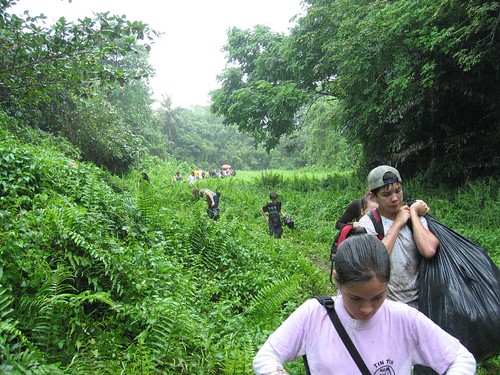
Singapore American School students emerging from the "wild"
"Why all the fuss? Besides being an eyesore, marine litter or debris can suffocate marine organisms, both invertebrate (for example, crabs and worms) and vertebrate (for example, fish, turtles, dugongs) animals and plants. Post-mortems have revealed up to six square metres of plastic in an individual mammal's stomach!ICCS is not just about mucking about in the mud or hauling trash. It's not just about picking litter or even recording it. At the end of the day, it's about making a concrete step to actually providing "arms" in the form of scientific data for protecting our environment. Of course by removing all these landmines from the beach and mangroves are also helping the organisms that live in these habitats.
Most of the material in marine debris are plastics, metal and glass, which do not break down quickly, and this trash can pile up for decades and will not be cleared but for concerted human effort. ... The trash load is so high, it prevents the re-growth of plants and colonisation by animals.
Along with the 77 participating countries, we submitted country reports to the Ocean Conservancy, USA, a marine conservation group. With international data sets stretching back 14 years, they are able to make representation to the United Nations about the global problem, and to push for laws and enforcement against dumping trash in the ocean."
Taken from Battling the Curse of Marine Litter, written by Sivasothi in Nature Watch, 2001
It is also events like these that inspire me and keep me going by looking, knowing and learning about others and what they do, doing it together with them and feeling that we've done something today.
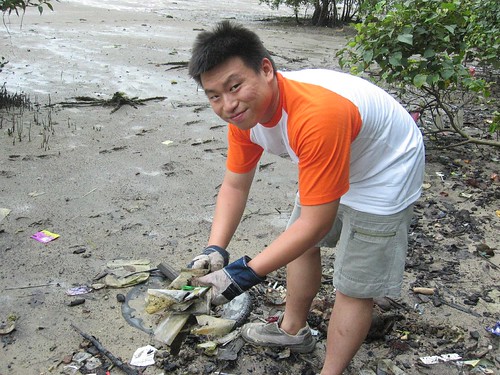
A NUS freshman who was inspired to do something and he did!
A first year student at NUS today who worked together with me told me that he's never been out in a nature area since secondary 2. However, after watching An Inconvenient Truth, he felt inspired to do something and make a difference, a small step in any ways and decided to participate in ICCS to make that first step. I truly admire those who take the first step and actually do something. I think this has been a great first step for him and I hope he feels that way too. And of course I pointed him to WildSingapore.com for more information on how you can learn and get involved!
Related Reads:
My ICCS 2007 Flickr Set
ICCS Wordpress Blog
ICCS Website
Ocean Conservancy Coastal Cleanup
Battling the Curse of Marine Litter

 I can be contacted at
I can be contacted at 





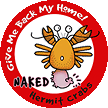

No comments:
Post a Comment